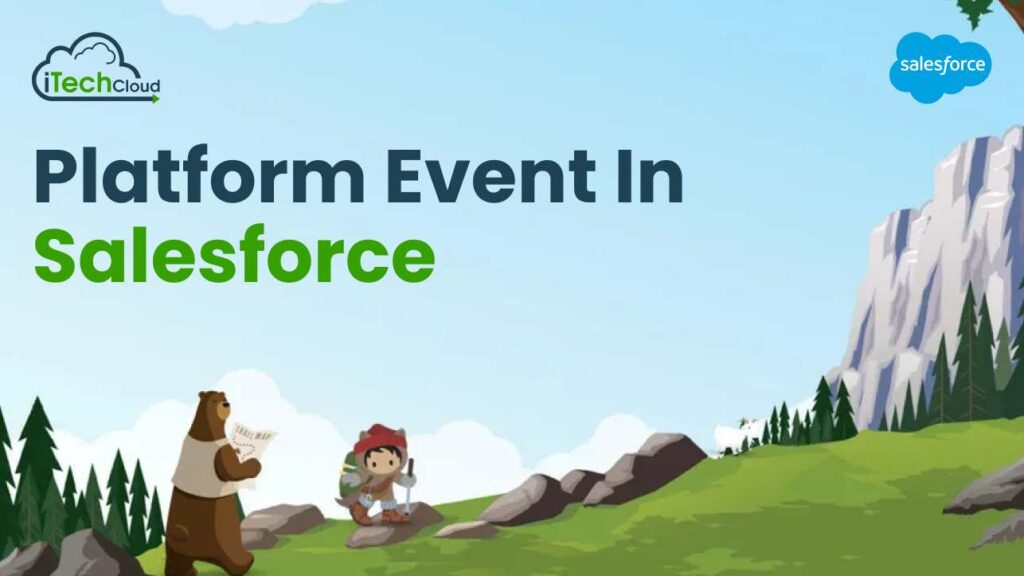Platform Event in Salesforce

Introduction:
In today’s fast-paced digital landscape, businesses rely heavily on seamless integration and real-time data exchange to drive efficiency and deliver exceptional customer experiences. Salesforce, as a leading CRM platform, recognizes the importance of enabling near real-time integration capabilities to meet these evolving needs. One such feature that empowers organizations to achieve this is Platform Events.
Table of Contents
What are Platform Event in Salesforce?
Platform Event in Salesforce serve as a powerful mechanism for facilitating near real-time communication and integration within the Salesforce ecosystem and beyond. At their core, Platform Event in salesforce represent a message or an occurrence that can be published and subscribed to within Salesforce. They provide a standardized way to broadcast and consume events, enabling different parts of an organization’s Salesforce instance to communicate effectively with each other and with external systems.
Key Components of Platform Event in Salesforce:
1. Event Definition:
A blueprint that defines the structure of the event, including its fields and data types. Event definitions are similar to custom objects but are optimized for streaming data and real-time processing.
2. Event Producer:
Any process or application within Salesforce that publishes events is considered an event producer. This could be triggered by user actions, workflow rules, Apex triggers, or external systems via Salesforce APIs.
3. Event Consumer:
Processes or systems that subscribe to events and take action based on them are event consumers. These could include Apex triggers, processes, external systems, or even external applications integrated with Salesforce.
Benefits of Platform Event in Salesforce:
1. Near Real-Time Integration:
Platform Event in Salesforce enable organizations to achieve near real-time integration between Salesforce and other systems or applications. This is particularly valuable for scenarios where timely data exchange is critical, such as order processing, inventory management, or customer service.
2. Loose Coupling:
By decoupling event producers from event consumers, Platform Events promote a more modular and flexible architecture. Changes to one component are less likely to impact others, leading to easier maintenance and scalability.
3. Event-Driven Architecture:
Adopting an event-driven architecture allows for more responsive and scalable systems. Components can react to events as they occur, enabling better synchronization and coordination between different processes.
4. Scalability:
Platform Event in Salesforce are designed to handle high volumes of data and can scale to meet the needs of enterprise-level applications. Salesforce manages the infrastructure, ensuring reliable delivery and processing of events.
5. Integration Flexibility:
Platform Event in Salesforce can be integrated with various Salesforce features and external systems. They support both point-to-point and publish-subscribe patterns, enabling a wide range of integration scenarios.
Use Cases of Platform Event in Salesforce:
1. Real-Time Notifications:
Notify users or external systems about important events as they happen, such as new leads, cases, or opportunities.
2. Integration with External Systems:
Keep Salesforce synchronized with external databases, services, or applications by publishing and subscribing to relevant events.
3. Business Process Automation:
Trigger automated actions or workflows in response to specific events, streamlining business processes and reducing manual effort.
4. IoT (Internet of Things) Integration:
Capture and process data from IoT devices in real-time, enabling proactive maintenance, monitoring, or analysis.
Implementation Considerations:
1. Governor Limits:
Platform Event in Salesforce, like other Salesforce features, are subject to governor limits. Therefore, it’s essential to design your implementation with scalability and performance in mind to avoid hitting these limits.
2. Error Handling:
Implement robust error handling mechanisms to deal with exceptions and ensure reliable event processing. This includes handling scenarios such as event delivery failures or processing errors gracefully.
3. Security:
Consider security implications when designing event definitions and access controls to prevent unauthorized access to sensitive data. Ensure that only authorized users and systems can publish or subscribe to events.
4. Monitoring and Analytics:
Utilize Salesforce’s monitoring tools and analytics to track event performance, identify bottlenecks, and optimize your implementation over time. This includes monitoring event delivery, consumption, and processing times to ensure optimal performance.
Conclusion:
Platform Events offer a powerful mechanism for building event-driven architectures within Salesforce and integrating with external systems in near real-time. By leveraging this feature effectively, organizations can enhance their business processes, improve system responsiveness, and drive greater value from their Salesforce investment. Whether it’s enabling real-time notifications, streamlining business processes, or integrating with IoT devices, Platform Events empower organizations to stay agile and competitive in today’s digital landscape.

